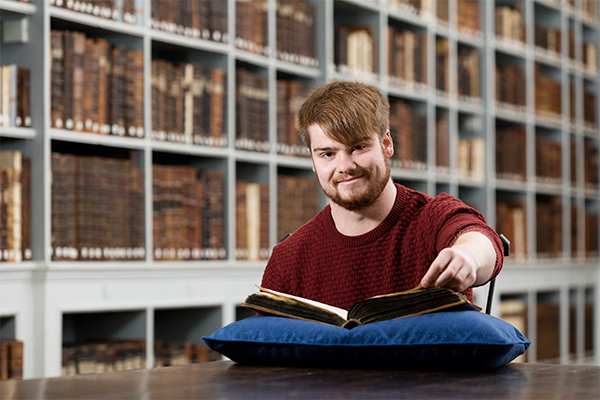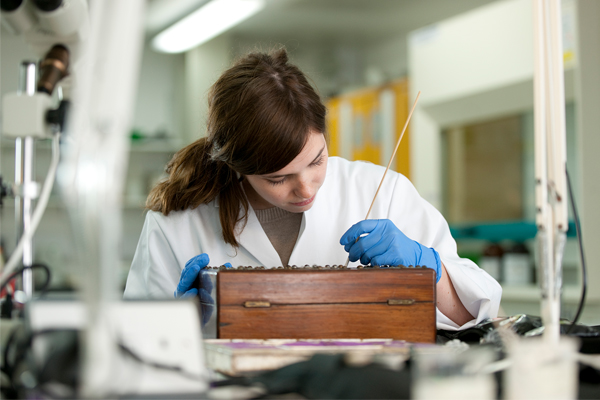Why Choose Lincoln
Links to industry
Complete a research project in a specialist area
Access real-world training facilities
Choose from optional modules

Lincoln's MA Conservation of Cultural Heritage enables students to gain hands-on experience while being taught by experts in the field. Students have the opportunity to develop a wide range of practical, theoretical and research skills in preparation for a career in heritage conservation.
The city of Lincoln is bursting with history and the city's rich cultural heritage makes it an ideal location in which to study conservation. Students have access to a wide variety of historic materials and can choose to focus on remedial treatment, preventive conservation, or collections management. There may also be opportunities to work with the University's commercial consultancy, Lincoln Conservation.
Students have access to a wide variety of materials from archaeological, social history, world cultures, and decorative arts contexts. For your research project, you can choose to specialise in certain modules and will learn with peers in high-specification, purpose-built laboratories in the University's Peter de Wint Building on campus.
For those already working in conservation, a blended learning option allows submission of practical projects derived from your current place of employment.
Links to industry
Complete a research project in a specialist area
Access real-world training facilities
Choose from optional modules

Most Conservation tutors and technicians are qualified conservators with a wide range of professional experience in the museum and heritage industry. Blended learning opportunities combining flexibility, support, and academic rigour also exist for those already working in the sector.
The composition and delivery of the course is different for each module and may include lectures, seminars, workshops, independent study, practicals, work placements, research, and one-to-one learning.
The four taught theory modules take place in four intensive non-consecutive weeks offering a flexible learning approach combining face-to-face teaching with online sessions.
The practical modules take place in the purpose-built facilities on campus. Students work with historic objects and cultural heritage materials provided from museums and private collections.
The composition and delivery of the course is different for each module and may include lectures, seminars, workshops, independent study, practicals, work placements, research, and one-to-one learning.
Weekly contact hours on this programme may vary depending on the individual module options chosen and the stage of study.
Postgraduate level study involves a significant proportion of independent study, exploring the material covered in lectures and seminars. As a general guide, for every hour in class students are expected to spend two - three hours in independent study or conducting practical work in the labs.
For more detailed information please contact the Programme Leader.
The University is home to Lincoln Conservation, a company that combines research, teaching, and commercial expertise. There may be opportunities within the year to apply to work on live projects, providing the chance to the fain professional experience and contextualise learning. The University’s reputation in the cultural heritage sector can also lead to opportunities for students to gain hands-on experience on historical materials from museums and private collections.

This is a practical module covering the conservation treatment of one or more complex object(s) of cultural heritage. Exact content will depend on object type chosen. This module allows students to choose to specialise in a specific material discipline, or alternatively to pursue broader options.
This is a practical module covering the conservation treatment of one or more complex object of cultural heritage. Exact content will depend on object type chosen. This module allows students to choose to specialise in a specific material discipline, or alternatively to pursue broader options.
With changes in the employment patterns of conservators, the need for a diverse range of skills has become more pronounced.
This module complements skills learnt in the other core modules.
Students will learn through a combination of project based activities, critical reflection and co-creation. The module will build on background understanding and experience to increase their confidence and skills and prepare students to capitalise on a broad range of career possibilities beyond the university.
This module aims to develop knowledge of investigative techniques and its relevance to conservation and heritage science. Students will learn about a range of analytical methods and digital tools that can be used for monitoring and analysis of cultural heritage materials.
The module challenges conservation students to think broadly about the objects that they conserve. This module will encourage students to explore this process of assessing significance which supports institutions in attaining a deeper understanding objects and the values that they might hold for different audiences. This module will help students develop the analytical skills needed to assess the value of an object and how these fit into current professional structures within the heritage industry.
Lectures and workshops will explore different intellectual approaches material culture and how each might contribute to the meaning and significance of an object or collection. The assessments will encourage students to produce professional museological documentation and relate the content of this module to collections management.
This module aims to give students the opportunity to apply and develop their existing knowledge and skills to an independent research project in an area of their own choice. The students will further develop, design and implement a research project in consultation with a supervisory tutor, and they will have the opportunity to reflect critically on a specialist area of cultural heritage relating to their Masters programme.
Please note that students are expected to cover their own travel, accommodation and general living expenses during the completion of the research project. These costs are likely to vary depending on where the student chooses to conduct their research.
The module provides the underpinning theoretical study for understanding the principles and practice of collections management and care. The module introduces student to the “life-cycle” of museum objects and covers key issues concerning collections development, management of the internal and external environment, collections documentation and care. Procedures such as collections surveys, risk management, and emergency planning will be considered.
This module is designed to address key issues in collections management, with a focus on digital collections. As well as aiming to introduce key theory and concepts, the module contains a strong practical dimension, as students have the opportunity to participate in the production of metadata, the development of a content management system and the application of a content management system to supporting exhibition development.
† Some courses may offer optional modules. The availability of optional modules may vary from year to year and will be subject to minimum student numbers being achieved. This means that the availability of specific optional modules cannot be guaranteed. Optional module selection may also be affected by staff availability.
We want you to have all the information you need to make an informed decision on where and what you want to study. In addition to the information provided on this course page, our What You Need to Know page offers explanations on key topics including programme validation/revalidation, additional costs, and contact hours.
Examples of assessment methods that may be used include presentations, essays, reports, practical work, journal articles, websites, or blogs.
Students on the blended learning option are required to submit a monthly report to monitor their progress, and online tutorials are offered by the module tutor.
The University of Lincoln's policy on assessment feedback aims to ensure that academics will return in-course assessments to students promptly usually within 15 working days of the submission date.
To obtain the MA, students must submit a 15,000-word dissertation.
Postgraduate Application Support
Applying for a postgraduate programme at Lincoln is easy. Find out more about the application process and what you'll need to complete on our How to Apply page. Here, you'll also be able to find out more about the entry requirements we accept and how to contact us for dedicated support during the process.

First or second class honours degree in conservation or equivalent professional experience.
If you have studied outside of the UK, and are unsure whether your qualification meets the above requirements, please visit our country pages https://www.lincoln.ac.uk/studywithus/internationalstudents/entryrequirementsandyourcountry/ for information on equivalent qualifications.
Overseas students will be required to demonstrate English language proficiency equivalent to IELTS 6.5 overall, with a minimum of 6.0 in each element. For information regarding other English language qualifications we accept, please visit the English Requirements page https://www.lincoln.ac.uk/studywithus/internationalstudents/englishlanguagerequirementsandsupport/englishlanguagerequirements/.
If you do not meet the above IELTS requirements, you may be able to take part in one of our Pre-session English and Academic Study Skills courses. https://www.lincoln.ac.uk/studywithus/internationalstudents/englishlanguagerequirementsandsupport/pre-sessionalenglishandacademicstudyskills/ . These specialist courses are designed to help students meet the English language requirements for their intended programme of study.
We encourage all applicants to attend an interview. Virtual interviews on Skype or Microsoft Teams can be accommodated. Submission of a full CV and supporting electronic portfolio is required.
You will need to have funding in place for your studies before you arrive at the University. Our fees vary depending on the course, mode of study, and whether you are a UK or international student. You can view the breakdown of fees for this programme below.
The University offers a range of merit-based, subject-specific, and country-focused scholarships for UK and international students. To help support students from outside of the UK, we offer a number of international scholarships which range from £1,000 up to the value of 50 per cent of tuition fees. For full details and information about eligibility, visit our scholarships and bursaries pages.
Postgraduate Funding Options
Find out more about the optional available to support your postgraduate study, from Master's Loans to scholarship opportunities. You can also find out more about how to pay your fees and access support from our helpful advisors.

Postgraduate study is an investment in yourself and your future. It can help you to further or completely change your career, develop your knowledge, enhance your salary, or even prepare you to start your own business. Graduates have gained employment as conservators in museums, galleries, historic houses, and conservation agencies, nationally and internationally. Internships have included roles in natural history at the Horniman Museum, mechanical objects at Edinburgh Museum, and textile conservation for the National Trust at Blickling.
For more information about this course, please contact the Programme Leaders.
Dr Melina Smirniou
msmirniou@lincoln.ac.uk
Mrs Leah Warriner-Wood
LWarrinerWood@lincoln.ac.uk
To get a real feel for what it is like to study at the University of Lincoln, we hold a number of dedicated postgraduate events and activities throughout the year for you to take part in.
